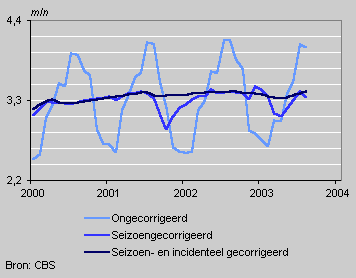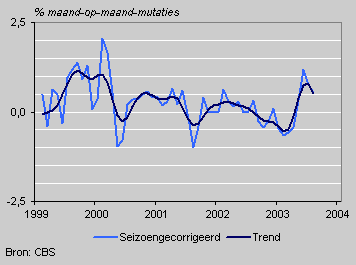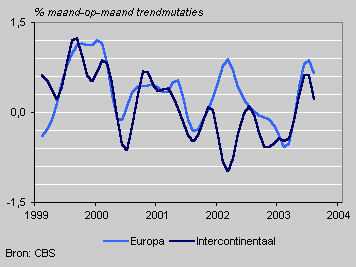Slightly more passengers travel from Schiphol

The growth in the number of passengers travelling via Schiphol Airport in Amsterdam has slowed down since 2000. However, since spring 2003 the trend has turned upwards again.
This is revealed by an analysis by Statistics Netherlands of passenger figures over a longer period, corrected for the effects of calamitous events and seasonal patterns.
Passengers travelling via Schiphol

World economy and annual growth rates
There are substantial fluctuations in the annual growth rates for Schiphol. These are mainly the result of the terrorist attacks of 11 September 2001, the war in Iraq and the outbreak of SARS. Corrected for these calamities the annual growth of passenger transport has slowed down since 2000. This coincided with a worldwide economic decline.
Passengers travelling via Schiphol, by month-on-month change

Underlying month-on-month growth stagnating
The month-on-month trend shows a peak in 1999, followed by a low in 2003, but also shows that growth has picked up in 2003.
Passengers travelling via Schiphol: Europe and the rest of the world

The growth in passenger transport is carried to an important extent by transport within Europe. This is a very relevant factor for Schiphol Airport, as European flights account for two-thirds of total passengers travelling via Schiphol.
Two million fewer passengers because of calamities
The effect of the above-mentioned calamities and the seasonal pattern on passenger numbers for Schiphol can be calculated at an estimated loss of two million. This is the equivalent of two-thirds of the number of passengers in a normal month.
The terrorist attacks in New York on 11 September 2001 resulted in one and a half million fewer passengers flying via Schiphol. This is the equivalent of half of the monthly number of passengers. Aircraft carried 860 thousand fewer passengers on intercontinental flights and 620 thousand fewer within Europe than normal to and from Schiphol.
The effect of the Iraq war and the SARS epidemic was computed to be a loss of half a million passengers, one sixth of the normal monthly number of passengers. For European flights alone, the loss was calculated at roughly 275 thousand passengers, while 250 thousand fewer passengers booked intercontinental flights via Schiphol.
Roberto Wekker